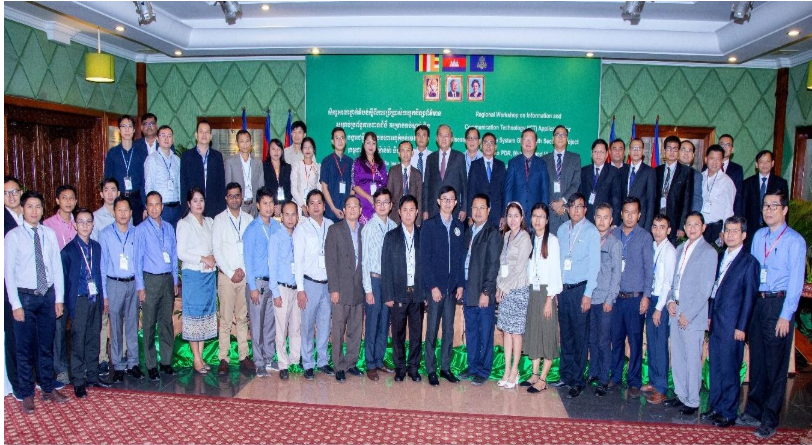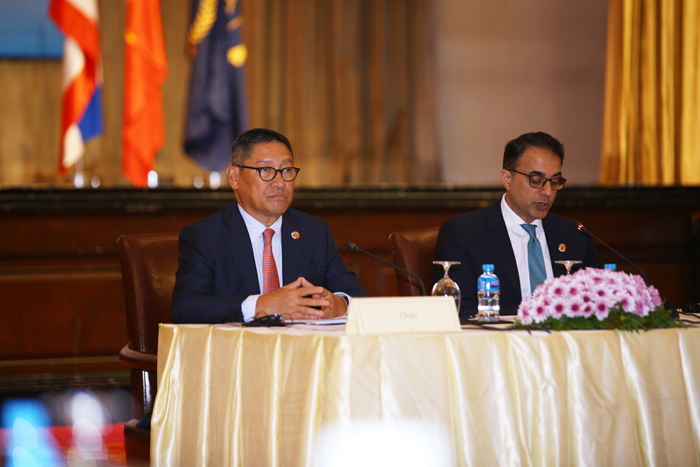Promoting Women's Participation in Sustainable Tourism Development
This piece highlights how sustainable tourism development can support the empowerment of women and minorities.
The Asian Development Bank approved the technical assistance Strengthening Regional Health Cooperation in the Greater Mekong Subregion – Phase 2 on 2 December 2024. This technical assistance supports the implementation of the new GMS Health Cooperation Strategy 2024-2030. Strengthening regional health cooperation will help realize a healthy and sustainable GMS community. The project aims to achieve this through three outputs: (i) operationalizing the strategic pillars of the new strategy; (ii) promoting and expanding knowledge support for regional health cooperation in the GMS; and (iii) strengthening operational support for the GMS Woking Group on Health Cooperation and its secretariat.
Phase 1 of the technical assistance, which concluded on 17 May 2024, established the GMS Working Group on Health Cooperation and its secretariat and developed the GMS Health Cooperation Strategy 2019–2023.
The GMS Regional Health Cooperation Strategy 2024-2030 emphasizes health issues that are regional in nature and require collective action to address. It has two strategic pillars: regional health security and health system strengthening toward universal health coverage.
Scaling Up One Health Approaches in the Greater Mekong Subregion provides an overview of One Health in the GMS and its relationship to addressing climate change. It details One Health activities in the subregion and recommends how they can be scaled up, including specific investment opportunities.
The GMS health agenda under the GMS Program Strategic Framework 2030 (GMS-2030) focuses on communicable disease control through cross-border surveillance and modeling, information exchange, implementation of international health regulations, and pandemic preparedness. Since universal health coverage is a critical regional public good, GMS-2030 aims to accelerate its implementation through strengthening the performance of GMS health systems to prevent, detect, and respond to public health threats such as COVID-19 and other emerging diseases; support countries to comply with the World Health Organization’s International Health Regulations; apply a unified approach to environmental, animal, and human health (“One Health”); strengthen protection of vulnerable communities and migrants; build capacity and cross-border cooperation to address priority health issues; and advance in gender equality to build subregional health cooperation leadership and decision-making policy.
Vision: Through collective efforts, the GMS Program aims to foster a healthy and sustainable GMS community, where the well-being of all citizens is pursued.
This vision is aligned with GMS-2030. Central to its attainment are two outcomes also aligned with the GMS-2030 and with the GMS-2030 Results Framework:
The GMS HCS 2024–2030 is underpinned by two pillars:
Strategic Pillar 1: Regional Health Security: The vulnerability of the GMS to health security risks is widely acknowledged. The GMS is particularly vulnerable to infectious diseases due to its high biodiversity, frequent human to animal interactions, and rapid urbanization, which facilitate the spread of zoonoses and other pathogens. Additionally, cross-border trade, intensive livestock farming, weak health systems, and environmental degradation further contribute to the region’s susceptibility to outbreaks and the rise of AMR; thus, it is critical for the GMS to align activities and technical areas that contribute to public health, preparedness, response, and resilience
Strategic Pillar 2: Health System Strengthening Toward Universal Health Coverage: Strengthening the health system with an emphasis on equity and resilience is vital for achieving Universal Health Coverage (UHC) and health security. This approach also supports broader socioeconomic advancement. According to UHC2030, it is the most effective and sustainable way to meet UHC and health security objectives. GMS-2030 aims to accelerate the implementation of UHC offering a chance for increased and more targeted investments in the core elements of health systems, particularly primary health care (PHC). Service accessibility, availability, and individual acceptability play important roles in facilitating or hindering vulnerable populations, including older people’s access to health care services. Addressing these factors is crucial for achieving UHC, since it ensures everyone—regardless of their vulnerabilities—can receive the health services they need without facing financial hardship. By prioritizing the unique needs of these groups, health systems can reduce disparities, improve health outcomes, and promote equity, ultimately leading to a more inclusive and resilient health care system.
The GMS HCS 2024–2030 will guide programming, foster innovation, increase engagement with the development and private sector partners, and mobilize new financing to support its implementation. In addition to its two strategic pillars, Its crosscutting themes are gender, climate change, and digital health.
The 5-year strategy focused on three strategic pillars: (1) health security as a regional public good, (2) health impacts of connectivity and mobility, and (3) health workforce development.
Established under the Asian Development Bank (ADB)-funded technical assistance Strengthening Regional Health Cooperation in the Greater Mekong Subregion – Phase 1 in 2019, the GMS Working Group on Health Cooperation (WGHC) serves as a platform for addressing regional health challenges. It facilitates dialogue and supports the development of policies, strategies, and programmatic responses. WGHC operationalized, governed, and institutionalized the GMS Health Cooperation Strategy (HCS) 2019–2023, with nominated representatives from the six countries, terms of reference, and reporting systems endorsed by the respective health ministers
Approved by ADB on 2 December 2024, this technical assistance supports the implementation of the new GMS HCS 2024-2030. Strengthening regional health cooperation will help realize a healthy and sustainable GMS community. The project aims to achieve this through three outputs: (i) operationalizing the strategic pillars of the new GMS HCS 2024-2030; (ii) promoting and expanding knowledge support for regional health cooperation in the GMS; and (iii) strengthening operational support for the GMS WGHC and its secretariat.
This technical assistance, approved by ADB on 22 August 2018 and concluded on 17 May 2024, supported the establishment of the GMS Working Group on Health Cooperation and its secretariat and supported annual meetings of the WGHC; developed the (a) GMS Health Cooperation Strategy 2019–2023, and (b) GMS Health Cooperation Strategy 2024–2030; supported annual meetings of the GMS WGHC and annual health cooperation workplans; produced knowledge products, including on migration, health, and One Health; and yielded six new GMS health sector investment projects.
Focal Persons at the Asian Development Bank
Rikard Elfving
Human and Social Development Sector Office
Sectors Group
Najibullah Habib
Human and Social Development Sector Office
Sectors Group
Other Concerned Staff & Consultants
Asadullah Sumbal
Regional Cooperation and Integration Unit
Southeast Asia Department
Rowena Sancio
Regional Cooperation and Integration Unit
Southeast Asia Department/GMS Secretariat
Send inquiries to GMS Secretariat.
This piece highlights how sustainable tourism development can support the empowerment of women and minorities.
The Third Meeting of the Greater Mekong Subregion (GMS) Working Group on Health Cooperation, jointly organized by the Ministry of Public Health of Thailand and the Asian Development Bank (ADB), was held on 12–13 December in Bangkok, Thailand.
The Asian Development Bank (ADB) today approved $2 million in new funding to support efforts to combat the spread of the novel coronavirus (nCoV).
The funds will supplement an ongoing regional technical assistance and strengthen response capacity in Cambodia, the People's Republic of China, the Lao People's Democratic Republic, Myanmar, Thailand, and Viet Nam.
The Third Meeting of the GMS Working Group on Health Cooperation (WGHC-3) was held on 12–13 December 2019 in Bangkok, Thailand. WGHC-3 was co-organized by the Ministry of Public Health (MOPH) of Thailand and the ADB.
The Third Meeting of the GMS Working Group on Health Cooperation (WGHC-3) was held on 12–13 December 2019 in Bangkok, Thailand. WGHC-3 was co-organized by the Ministry of Public Health (MOPH) of Thailand and the ADB.

Regional Workshop on Information and Communication Technology (ICT) for Surveillance System
The Ministry of Health (MOH) of Cambodia conducted a Regional Workshop on Information and Communication Technology (ICT) for Surveillance System on 5–6 September 2019 at Somadevi Angkor Hotel in Siem Reap, Cambodia.

Regional Workshop: Strengthening Risk Communications for Health Emergencies in the GMS
The Department of Communicable Disease Control of the Ministry of Health of the Lao People's Democratic Republic (Lao PDR) conducted a Regional Workshop on Strengthening Risk Communications for Health Emergencies in the Greater Mekong Subregion (GMS) on 12 to 13 September 2019 in Xieng Kouang Province, Lao People's Democratic Republic (under L3465/G0516-LAO: GMS Health Security Project).

Identifying Strategies and Policies to Improve Health Services’ Access and Availability for Ethnic Groups and Vulnerable Populations in the Greater Mekong Subregion
The Ministry of Health (MOH) of the Lao People's Democratic Republic (Lao PDR) conducted a Regional Workshop on Identifying Strategies and Policies to Improve Health Services’ Access and Availability for Ethnic Groups and Vulnerable Populations in the Greater Mekong Subregion (GMS) on 12–13 December 2019 in the Don Chan Palace Hotel, Vientiane.

Seated from left: Mr. Sok Chenda Sophea, Minister attached to the Prime Minister, Minister in charge of GMS Cooperation Program/GMS Minister, Secretary General, Council for the Development of Cambodia, and Mr. Ahmed M. Saeed, Vice President for ADB Operations in the Southeast Asia Department, the East Asia Department, and the Pacific Department at the 23rd GMS Ministerial Conference. Photo by ADB.
The Asian Development Bank (ADB) remains committed to supporting the future initiatives of the Greater Mekong Subregion (GMS) Program. Mr. Ahmed M. Saeed, Vice President of ADB, reaffirmed ADB’s support in his speech at the recently-concluded 23rd GMS Ministerial Conference (MC-23). The MC-23 was Mr.

Heads of GMS country delegations participate in the 23rd GMS Ministerial Conference. Standing from left are Mr. Vu Dai Thang, Deputy Minister, Ministry of Planning and Investment, Viet Nam; Mr. Aung Htoo, Deputy Minister, Ministry of Commerce, Myanmar; Ms. Cheng Lihua, Vice Minister, Ministry of Finance, PRC; Mr. Sok Chenda Sophea, Minister attached to the Prime Minister, Minister in charge of GMS Cooperation Program/GMS Minister, Secretary General, Council for the Development of Cambodia; Mr. Viengsavath Siphandone, Deputy Minister, Ministry of Public Works and Transport, Lao PDR; Mr. Thaworn Senneam, Deputy Minister, Ministry of Transport, Thailand; and Mr. Ahmed M. Saeed, Vice President for ADB Operations in the Southeast Asia Department, the East Asia Department, and the Pacific Department. Photo by ADB.
The Royal Government of Cambodia and the Asian Development Bank (ADB) organized the 23rd GMS Ministerial Conference on 17-18 November 2019 in Phnom Penh, Cambodia, with the theme “Greater Integration, Inclusivity and Sustainability in the GMS.” The meeting brought together GMS Ministers and Senior Officials of the six GMS countries—Cambodia, the People’s Republic of China (PRC), Lao People’s Democrati